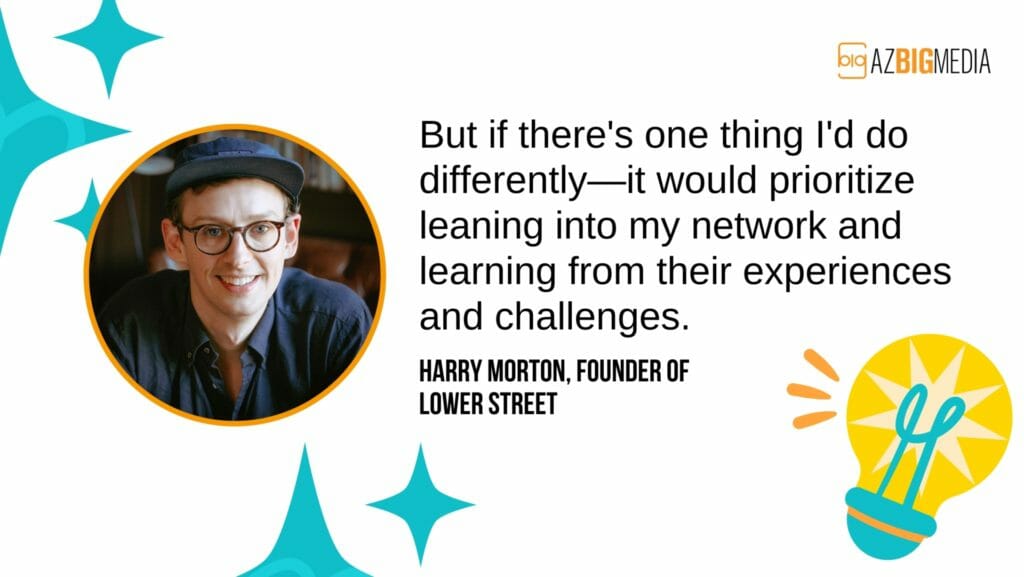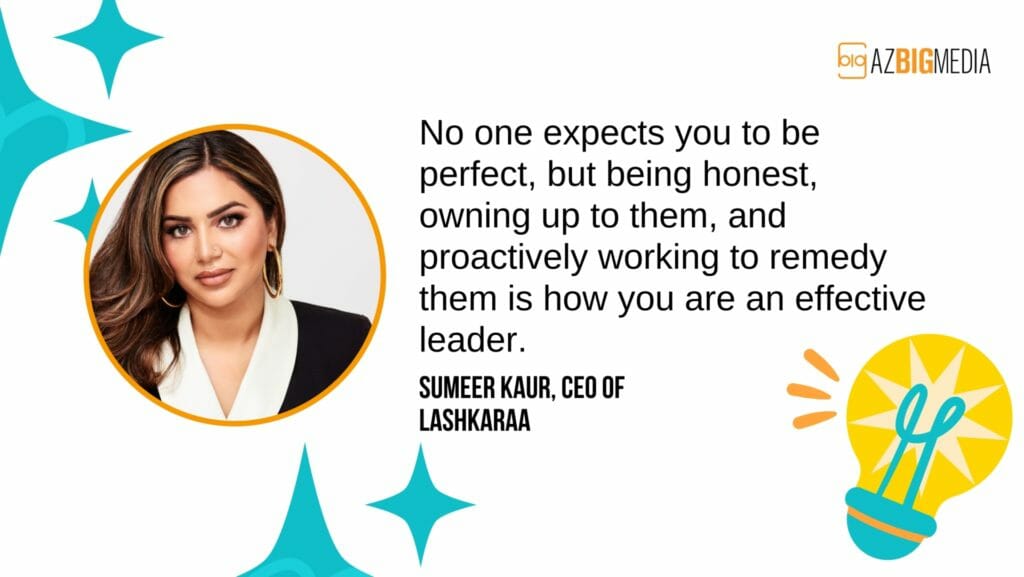From relying on a strong network to knowing a large workload doesn’t equate to productivity, here are the 17 answers to the question, “What are some important things you wish you knew starting out in your first leadership role?”
READ ALSO: Ranking Arizona Top 10 lists for 2022
- Lean Into Your Network a Lot More
- Deliberately Build Trust
- Be Selective With Your First Hire
- Know It’s Ok to Not Know Everything
- Grow a Thick Skin
- Realize the Learning Never Ends
- Learn What Motivates Your Employees
- Listen to Your Team’s Ideas
- Grow With Your Employees
- Understand the Power of Delegation
- Use the Power of Positive Reinforcement
- Lean Into Situations Where You Don’t Always Have the Right Answer
- Avoid Trying to Please Everyone
- Be Less Self-Critical and Gentle With Yourself
- Set the Tone, Be Honest, and Accountable
- Take Small, Continuous Steps
- Learn an Increase in Workload Doesn’t Add Productivity
Lean Into Your Network a Lot More
It’s natural to have your hands full when you step into a leadership role, which is why networking and collaboration often take a backseat. But if there’s one thing I’d do differently—it would prioritize leaning into my network and learning from their experiences and challenges.
Your network can be a goldmine of information and often connect you to people who can help you excel in your new role, offer insider insights, or even be a source of inspiration when the going gets tough.
Harry Morton, Founder, Lower Street

Deliberately Build Trust
When I first stepped into the role of a leader, I wish I had understood the importance of building trust and developing relationships. All too often, when starting, we can focus on generating results quickly instead of nurturing our team’s growth or taking the time to establish meaningful connections with peers and colleagues.
I’ve learned that creating an atmosphere of open dialogue and genuine understanding is key to fostering an environment that drives excellent performance—not just for this month but for years to come.
Ryan Rottman, Co-Founder & CEO, OSDB Sports
Be Selective With Your First Hire
When first starting in a leadership role, it’s important to remember that your first hire will reflect you. So take your time and choose the right person for the job.
Think about the qualities you’re looking for in a new employee and make sure the candidate possesses them. Ask yourself questions like: What are this person’s strengths? What motivates them? And what do they care about most?
The most important thing is to find someone who shares your values and is passionate about your work. Someone eager to learn and grow with the company. So don’t be afraid to take your time in finding the perfect candidate—it will be worth it in the end.
Gosia Hytry, Head of Content, Spacelift
Know It’s Ok to Not Know Everything
The most important thing to know before starting out in a leadership role is that it’s okay not knowing everything. A lot of new leaders like to act like they’re the champion of knowledge for their division or team. However, this can cause trouble with your direct reports, especially the ones who make sure that you have the information you need to make excellent decisions for the company.
In fact, some team members might feel insulted or resentful if they’re not given credit for the work they did for company-wide investigations. Being honest about where you needed help from your team is humble and human, and does a lot to make you seem approachable and trustworthy to your team. That trust helps make a team strong and committed to improving year after year.
Shawn Plummer, CEO, The Annuity Expert
Grow a Thick Skin
Leadership is much more than delegating tasks and directing a team. As the leader, you’re also responsible for creating connections that will propel your team’s vision. But networking in the business world is a dog-eat-dog game. It forces you to grow a thick skin to handle countless moments of rejection.
When I started in healthcare marketing, many of the people I reached out to ignored my requests for market research interviews or even data on the state of our industry. Creating a startup can be emotionally challenging because success is a numbers game. You need to come prepared to spend hours prospecting and searching for connections without burning out.
Know that every rejection is just a step closer to the person who is ready and willing to help you. The struggle makes every milestone—no matter how small—extremely rewarding.
Stephan Baldwin, Founder, Assisted Living Center
Realize the Learning Never Ends
The biggest thing I learned, which I didn’t realize early in my career, is how much I would grow, both personally and professionally, from all the different people and personalities I would encounter.
There is so much good that comes from higher education, but there is still nothing quite like hands-on learning, especially regarding human interaction and relationships, that comes from time and experience with others. And the beautiful part is that I, and we, can continue to open our minds to learn from others throughout the course of our lives… the learning never ends.
Jodi Low, Founder & Author, U & Improved
Learn What Motivates Your Employees
Take the time to learn what motivates your team. Every individual is unique, and many of your employees will be driven by different considerations. As a leader, your job isn’t just to tell people what to do. You also should be a source of support.
For many who are in their first leadership role, there’s a sense of pressure to be performing and to ensure that their reports are as well. But the best way to do this is to take an interest in your employees and hear from them directly. This will help your approach and how well you motivate them.
Rachel Roff, Founder & CEO, Urban Skin Rx

Listen to Your Team’s Ideas
I won’t term it arrogance, but I sure had an overdose of confidence to go with my new role as a leader, and this overconfidence often led me to believe that, as a leader, my ideas had to be the best.
Soon enough, I was stripped of all these wrong notions, but in a good way. The more I interacted with my team members, the more I realized that as a leader, it wasn’t my job to thrust my ideas on everyone but to listen to everyone’s opinions and inputs to single out the best ideas.
These ideas may not always be mine, but they sure worked way better, and that’s all that matters. Today, as a successful serial entrepreneur, I thrive on the innovative ideas of others.
Kris Harris, Owner, Nootka Saunas
Grow With Your Employees
As a leader, I wish I knew that being a leader doesn’t mean you only have to guide your team or peers. All leaders have a responsibility to help their team to find solutions. They should also help their peers whenever they have a problem.
But there are some situations where you may not find answers immediately. It’s ok to fail sometimes. Instead of fretting or lamenting, you can discuss with your team to find a solution together. Leadership is all about learning and growing together. When you involve the team in a discussion, they feel involved and important.
They deem they are playing a vital role in the company’s growth. As a leader, you can also learn many things from your team. When you ask for help from your team, you build a strong connection with them. They will also feel free to ask you anything.
Michael Woods, Office Manager, Uniwide Formations
Understand the Importance of Delegation
Starting out, the biggest mistake that I made as a founder was not delegating. I was trying to do everything myself. As a beginner, I was determined to do as many things as I could to ensure maximum quality.
But gradually I learned that proper delegation makes employees more productive, empowered, and result-oriented. By assigning the right tasks to the right people, you acknowledge you trust their abilities, and it gives your employees great satisfaction and autonomy. As a leader, delegation saves a lot of time for you to focus on the higher-value aspects of the business.
Adit Jain, CEO & Co-Founder, Leena AI
Use the Power of Positive Reinforcement
My belief in acknowledgment has always been rooted in my observations of the positive effects of applauding crowds and praises.
I didn’t realize, however, that the recognition process must begin as soon as we begin our activities. We must start rewarding work because what is rewarded is repeated, and we want individuals to continue making the same efforts. Then, we must include some quick wins in our plans to acknowledge those initial triumphs, all of which contribute to the development of momentum.
Since recognition is one of the essential building blocks in developing high-performing teams, we, as leaders, do need to become chief recognition officers. However, it begins at the start of the voyage, not the end.
Shad Elia, CEO, New England Home Buyers
Lean Into Situations When You Don’t Know the Right Answer
When I look back on my first few months as a founder, I cringe. Whether it was my contractors or my clients, I always felt the pressure to have the right answer and to be 100% prepared for anything and everything.
That kind of thinking led to me burning myself out by trying to predict and prepare for things that I had no control over. Or worse, didn’t even end up being all that important.
Time is one of your most crucial assets as a leader. You need time and space to plan effectively and steer the ship.
These days, I lean into moments when I don’t have the right answer. I’m honest and transparent about it and ask more questions and give more responsibility to employees to help me make the big decisions.
I’m more collaborative and delegate more readily. This shift in thinking hasn’t solved all my problems, but it has made my day-to-day life a heck of a lot less stressful.
Ken Marshall, Chief Growth Officer, RevenueZen
Avoid Trying to Please Everyone
One thing I had to learn the long and hard way is that being a leader means having to make decisions that not everyone will like. Leaders must know how to prioritize the company’s best interest, even if it means not being able to please everyone.
The goal is not to make the most popular decisions, but the ones that will move the team and company forward. It requires a level of discernment for leaders to conduct due diligence, consult the team, and assess the complete picture before making a judgment call.
Mark Woodbury, Co-Founder, Minerva Equity
Be Less Self-Critical and Gentle With Yourself
The first leadership role is like riding a giant wheel. Some days, we are closer to the ground, and everything looks familiar. On other days, we are at the top of the wheel and become disoriented. The bird’s-eye view of all the responsibilities is also utterly dizzying.
During the first few months of taking on my first leadership role, the vast amount of information I had to soak up was overwhelming. Looking back, I wish someone had told me to be gentle with myself and not self-critical.
My advice to new leaders is to take their time to ease into the role and get comfortable with not having the answers to everything. The best approach is to have a growth mindset and a can-do attitude.
Vajitha Ghouse, Emotional Intelligence & Leadership Coach, Aurelia Group
Set the Tone, Be Honest, and Accountable
As a leader, you are setting the tone for the organization, so ensure you instill positive values, such as honesty and accountability. One of the most important things to remember when stepping into a leadership role is to realize you will make mistakes. No one expects you to be perfect, but being honest, owning up to them, and proactively working to remedy them is how you are an effective leader.
People will respect you more if you are quick to admit a mistake rather than blaming, hiding, or avoiding it. Set the tone for the entire organization by embodying the values you want to see in others.
Sumeer Kaur, CEO, Lashkaraa

Take Small, Continuous Steps
I wish I had known that success as a leader is not achieved overnight, but through gradual and consistent effort over time. When I first started my company, I was so eager to see the results that I would think that robust success should be instant. When I was competing in Jeopardy, I felt the same way—that I should win the overall competition with my brilliance.
What I later realized is that long-term success is only achieved through small steps and continuous effort. No matter how small the successes were, I had to focus on taking one step at a time, and eventually, I got to where I wanted to be. Same with Jeopardy, you can only win by correctly answering one question at a time.
Dan Troha, Founder, Trivia Bliss
Learn an Increase in Workload Doesn’t Add Productivity
One flaw of old-school leadership ideology includes the jaded concept behind workload distribution. I grew up sharing the archaic mindset of drawing more from less and, in theory, this made sense.
If you’re able to squeeze out more potential, it should translate to increased productivity. This is false, and I wish I knew this when starting out in my first leadership role. I eventually concluded that an increase in workload would only restrict productivity, and that was the start of my evolution as a leader.
I came to realize factors such as employee autonomy, accountability and transparency were far more important for fostering a positive workplace culture and increasing productivity.
Shawn Harris, CEO, UniqueGiftCards




